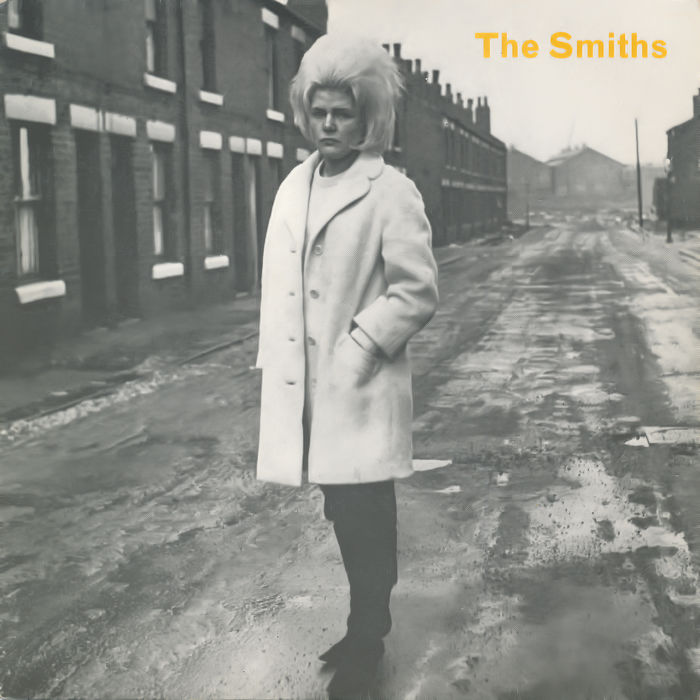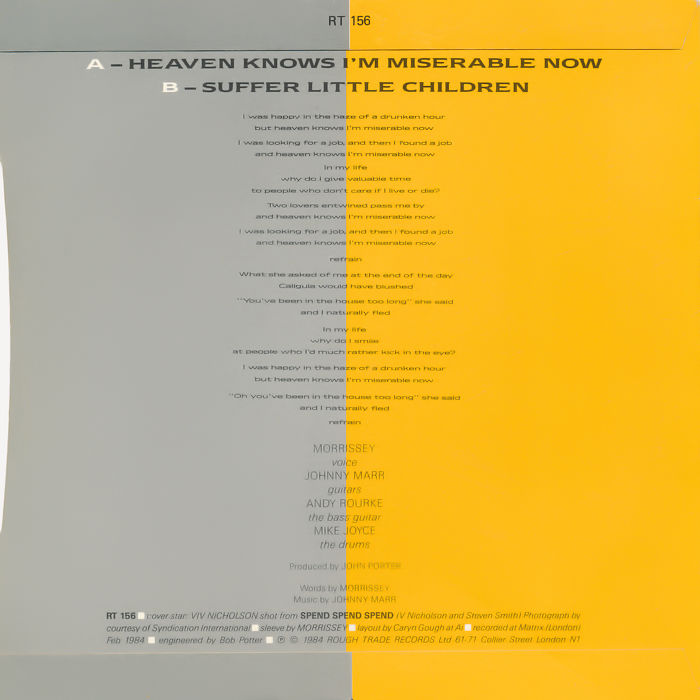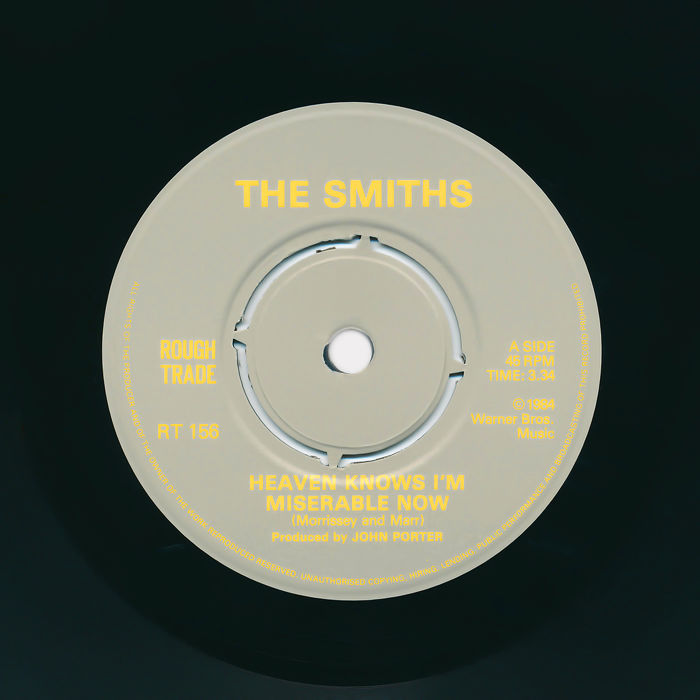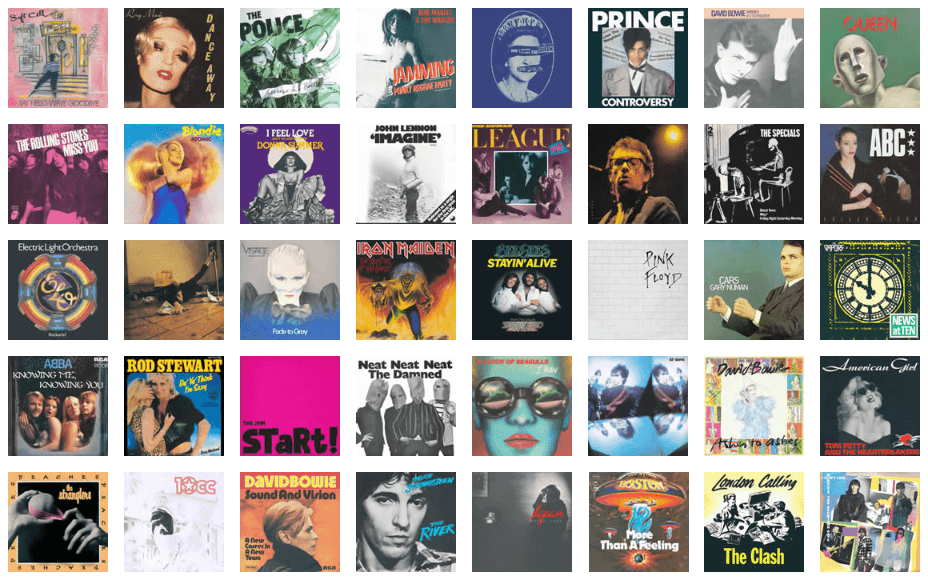The Story Behind The Song
It took just four years to blow a fortune. After scooping the football pools jackpot in September 1961, the riches-to-rags-again story of Viv Nicholson is a well-known cautionary tale. Good times don't last, not for a Yorkshire factory worker. Two decades later, long after the money had been frittered away, her image adorned the cover of Heaven Knows I'm Miserable Now, the fourth single from The Smiths.
"I was happy in the haze of a drunken hour," begins one of the most memorable openings in pop music, "But Heaven knows I'm miserable now." Good times don't last, apparently not for lead singer Morrissey. And everything that should make him feel better actually makes him feel worse. He finds a job - no mean feat at the time when unemployment peaked at over 3 million - but discovers he is still depressed. He dislikes the people he works with and the feeling is mutual. "Why do I give valuable time to people who don't care whether I live or die?" Yet he continues to wear the mask of social geniality. "Why do I smile at people who I'd much rather kick in the eye?"
Even an amorous encounter goes badly when he is invited to do things that would have made Caligula blush. The reference is to the Roman emperor notorious for his sexual depravity, particularly his sororal incest and rape of aristocratic wives in front of their husbands. To be fair to the sadistic pervert, he was not the only emperor with such grotesque behaviour, but history remembers his degeneracy in particular, especially when an infamous porn film was named after him in 1979.
The lyric is also a nod to Sandie Shaw's 1969 release Heaven Knows I'm Missing Him Now which is about the regret of letting true love slip through your fingers. By comparison, everything is bleak in Heaven Knows I'm Miserable Now - apart from the uplifting music. Words seem inadequate to accurately describe the mesmerising guitar riffs of Johnny Marr: the high and low registers, the fast and slow picks, the vibrato punctuation. Once heard, you want to play the track again like an addict needing a fix. The juxtaposition of upbeat music and downbeat lyrics suits any mood. If you're happy, you are carried away by the music like an outgoing tide. If you're more lugubrious, you recite each line like poetry, wallowing in self-pity and melancholy.
Johnny Marr wrote the music on the iconic Gibson ES-355; when it was first manufactured in 1958 it was the first hollow-bodied electric, or semi-acoustic, guitar. It was bought for him by a record executive on condition that The Smiths signed to his label. Marr even remembers the date: 2 January 1984. Back in his New York hotel room, he wrote the music in about hour. If that wasn't enough, he also wrote the music for Girl Afraid. "Those two songs are always in my mind like a pair," he later said, "because they were both written in the same day on this guitar." It was the additional B-side on the 12" single.
The 7" single was released with Suffer Little Children as the B-side. About the Moors murders, it was controversial because some shrill newspapers ranted that the cover image of Viv Nicholson - her bleached blonde hair set in a wild bouffant - resembled Myra Hindley. It was a coincidence. Nicholson was a working class celebrity. A young woman plucked from the factory floor and thrust into a life of fabulous wealth, it mattered less how she got there than the fact that she was there at all. On their meagre salaries, it would have taken her and her husband two centuries to earn the money they had won overnight. When they collected the cheque she vowed to "spend spend spend". True to her word, she splashed out on all the trappings of luxury - cars, jewellery, furs, champagne - but after her husband was killed in a car crash four years later, she was declared bankrupt. After the good-time haze lifted, she was left with alcoholism and depression.
Nicholson met The Smiths in 1986 and was astounded to find her image plastered over the posters for their Meat Is Murder tour. She had become something of an icon for the group, and appeared on two more single covers. For The Smiths, Heaven Knows I'm Miserable Now gave them an official Top 10 hit in the UK for the first time (and their biggest hit on the NME chart) and exposed the indie group to a wider audience. Its legacy - apart from being one of the finest singles of the 1980s - is that everyone thinks Morrissey is a miserable grouch, something he cheerfully denies. But perhaps that's why it is one of the few Smiths songs he has never covered in his concerts.
We hereby instate Heaven Knows I'm Miserable Now by The Smiths on The Wall as No.3 Best Single of 1984
Very few singles have been released with the word "miserable" in the title but this has to be the best of them.Dave B




